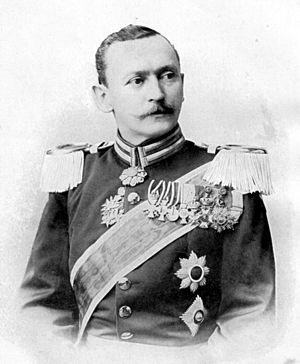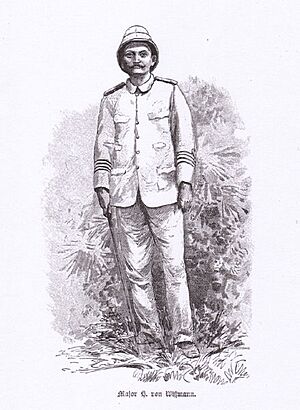Hermann Wissmann facts for kids
Quick facts for kids
Hermann von Wissmann
|
|
|---|---|
 |
|
| 4th Reichskommissar of German East Africa | |
| In office 25 April 1895 – 4 December 1896 |
|
| Preceded by | Friedrich von Schele |
| Succeeded by | Eduard von Liebert |
| Personal details | |
| Born | 4 September 1853 Frankfurt an der Oder, Kingdom of Prussia |
| Died | June 15, 1905 (aged 51) Weißenbach, Austria-Hungary |
| Children | Hermann von Wissmann |
| Signature | |
| Nickname | Deutschlands größter Afrikaner |
| Military service | |
| Allegiance | |
| Branch/service | |
| Years of service | 1873–1896 |
| Rank | Major |
Hermann von Wissmann (born September 4, 1853 – died June 15, 1905) was a German explorer and leader in Africa. He became famous for his travels and for helping to set up German rule in parts of East Africa.
Biography
Hermann Wissmann was born in Frankfurt an der Oder, which was part of Prussia at the time. He joined the Prussian Army in 1870. Four years later, he became a Lieutenant. He served in a regiment stationed in Rostock.
In 1879, Wissmann met an explorer named Dr. Paul Pogge. This meeting changed his life. In 1880, Wissmann took a break from the army. He joined Pogge on a trip through the Congo Basin in Africa.
In the eastern Congo, Wissmann and Pogge went their separate ways. Pogge stayed to build a research station. Wissmann continued his journey alone. He traveled all the way to the Indian Ocean, crossing what is now Tanzania. For his important explorations, he received the 1888 Founder's Medal from the Royal Geographical Society.
After his travels, Wissmann worked for King Leopold II of Belgium. The king was building his own empire in Africa, called the Congo Free State.
In 1883, Wissmann met a Songye leader named Nsapu Nsapu. Wissmann gave him the name "Zappo Zap." This leader ruled a large town with many people. Zappo Zap's people became allies of the Congo Free State. They helped the colonial authorities. Later, in 1899, they were sent to collect taxes. This led to serious problems for many villagers.
In 1888, a German company tried to take control of parts of East Africa. But they faced strong resistance from African people. The company asked German Chancellor Bismarck for help. At first, he said no.
However, in 1889, Wissmann was promoted to captain. He was made the chief administrator for the German East Africa region. His main job was to stop the Abushiri Revolt. This revolt was led by Abushiri ibn Salim al-Harthi. Wissmann was given a clear order: "Victory."
On his way to East Africa, Wissmann hired a special group of soldiers. Most of them were Sudanese. He also added some Zulus from South Africa. German officers led these forces.
With help from the British navy, Wissmann's forces made Bagamoyo and Dar es Salaam stronger. They also took back Tanga and Pangani. Wissmann's army had better weapons. They were able to take back the rest of the coastal area. They also made the inland fort of Mpwapwa stronger. They reopened the main trade route through the area. Soon after, Abushiri was captured and executed in Pangani in December 1889. In January 1890, Wissmann offered a general pardon to the remaining rebels.
Wissmann was promoted to major in 1890. He returned to Germany and was welcomed as a hero. In 1891, he became a commissioner for the western part of German East Africa. By 1895, he was named Reichskommissar, which means he was the top leader. His son, also named Hermann, was born that same year.
Wissmann became ill. This forced him to leave the army and return to Germany in 1896. There, he wrote several books. He also gave many talks across Germany. He died in a hunting accident on June 15, 1905.
Legacy
Even though his officers respected him, Wissmann faced criticism from some German officials. They strongly disagreed with his harsh methods. These included destroying villages and not allowing people to disagree with him. The German General-Consul in Zanzibar, Michelies, called him a military dictator. Rear Admiral Karl August Deinhard also criticized him. He said Wissmann was arrogant and lacked good management skills.
The term "Wissmanntruppe" was used for the military and police units under Wissmann's command. These units later became the main part of the Schutztruppe. This was the official colonial army. It was formed after the German government took over East Africa.
In 1890, a steamship was built and named SMS Hermann von Wissmann. It was built in Germany, then taken apart and shipped to East Africa. It was put back together and launched on Lake Nyasa in September 1893. During World War I, the British captured it.
A smaller ship was named the SMS Hedwig von Wissmann. This ship was named after Hermann's wife. It was launched on Lake Tanganyika in September 1900. In 1916, it was sunk in a battle with two British ships.
See also
 In Spanish: Hermann von Wissmann para niños
In Spanish: Hermann von Wissmann para niños
 | Kyle Baker |
 | Joseph Yoakum |
 | Laura Wheeler Waring |
 | Henry Ossawa Tanner |


